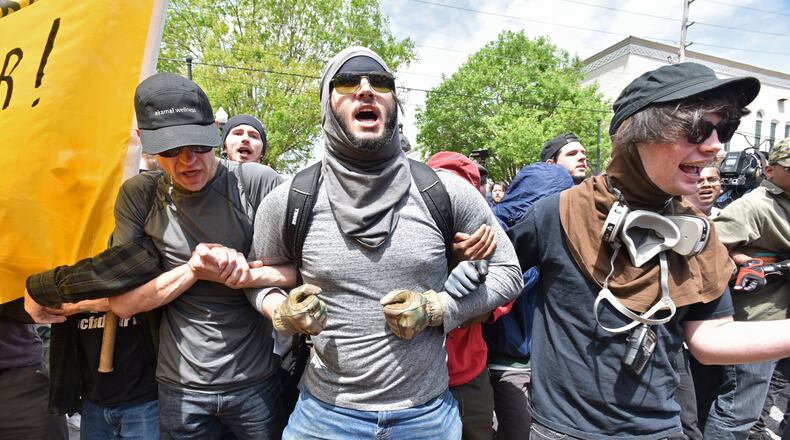We have grown more than slightly erratic when it comes to anonymity and political speech.
On Monday, 31-year-old Alan Hutzel, a restaurant cook from Savannah, made an appearance before a state court judge in Coweta County.
Back in April, he and a dozen or so counter protesters were arrested during a Nazi rally in Newnan. Coming only months after the white supremacist violence of Charlottesville, the Georgia event was one at which law enforcement outnumbered everybody.
Hutzel says he threw neither bottles, nor rocks, nor punches. He was not violent. The cook’s alleged crime: He was wearing a mask.
Since 1951, it has been illegal in Georgia to wear “a mask, hood, or device by which any portion of the face is so hidden, concealed, or covered” at public events. It is a misdemeanor, which means the maximum punishment is a $1,000 fine or a year in the hoosegow.
Exceptions were written in for such things as Mardi Gras and masquerade balls. Seriously – both events are named in the statute.
The object, of course, was to put a lid on the Ku Klux Klan. The last “mass” lynching in Georgia, at Moore’s Ford, was only five years past in 1951. A decade of violent opposition to integration lay ahead. The bombs of Birmingham had yet to detonate.
The state Supreme Court upheld Georgia’s anti-mask law in 1990, to hearty applause from the state’s civil rights community. But when they did so, justices also noted that “it would be absurd to interpret the statute to prevent non-threatening political mask-wearing.”
On Monday, Hutzel and his attorney argued that no intimidation was involved on his part. The parties are to meet again on Feb. 13 to continue the discussion.
Hutzel was kind enough to call Tuesday. If intimidation was not the purpose of his mask, I asked him, what was? “Wearing a mask for me was just an attempt to protect myself,” he answered. From “doxxing.”
This is defined as the publishing of private information on the internet, intended to harass or embarrass the target. The Nazis do it to the antifa, and the antifa do it to the Nazis. It’s how some of the white supremacists in the Charlottesville riot were tracked down.
I do not have much patience for this argument. It may be a prejudice that comes with putting one’s name to one’s work for 40 years, but the explanation smacks of overblown theatrics — and something worse. Fashion.
Masks on fictional superheroes are fine. But I do not like them in real-life situations involving actions that require personal accountability. I don’t like them on demonstrators, and I don’t like them on members of law enforcement – a parallel trend.
But Hutzel and I are of different generations, and so I explained my own history with the topic. I grew up watching John Lewis and his fellow civil rights protesters in the South, who never felt the need to cover their faces, I pointed out.
That would have defeated their purpose, which was to be identified – by name – as equal, individual members of society worthy of the law’s protection. Enduring arrest and its consequences were the price of admission.
But they didn’t have to contend with social media, Hutzel replied. And indeed they did not. They had their houses burned. They were shot in their driveways. Their skulls were cracked.
If that sounds wholly condemnatory of Hutzel’s position, it isn’t meant to be. The young man is merely following the logic of modern political campaigning.
Think of it this way: Let us assume that, as a cook from Savannah, Hutzel is a man of limited means. When it comes to his ability to mold public opinion, a tank of gas and a loud voice aimed at white supremacists may be about all he can afford. Georgia law says that he should be unmasked when he wields this influence.
Now let’s slip a few million dollars into the young man’s wallet. Let him and a few of his friends set up a Super PAC, or some other organization under the proper IRS code. Our young man can now jump into Georgia’s political debates with both feet, his cash fueling millions of TV sets that spew whatever message he likes, dangerous or benign.
In this fashion, he can inspire the masses in complete anonymity.
Tens of millions of dollars were spent during the 2018 election season – not just by candidates, but by independent groups. Some report the source of their cash, and others don’t.
A dark-money Washington D.C. group spent more than $3 million on ads and mailers hammering state Sen. David Shafer in the lieutenant governor’s GOP runoff race in July. Shafer narrowly lost the contest. Next Monday, as the Legislature reconvenes, former House member Geoff Duncan will be sworn in as lieutenant governor.
We still don’t know whose anonymous speech was freighted with those dollars. Legally, Duncan isn’t supposed to, either. Coordination by independent groups with established campaigns is forbidden.
The dark money has many worried. Just before Christmas, in an interview with the Rome News-Tribune, state Sen. Chuck Hufstetler, R-Rome, said he intended to address the problem.
The senator told the newspaper that U.S. Supreme Court rulings have made it difficult to put limits on private donations to certain types of nonprofits designed to influence elections. “But we want to make it easier for people to know where it came from,” Hufstetler said. A constitutional amendment may be required.
We haven’t been able to reach Hufstetler in the two weeks since. We hope he hasn’t altered course.
If when the street talks, it must do so unmasked, then when money talks, the same rules should apply.
About the Author
The Latest
Featured



